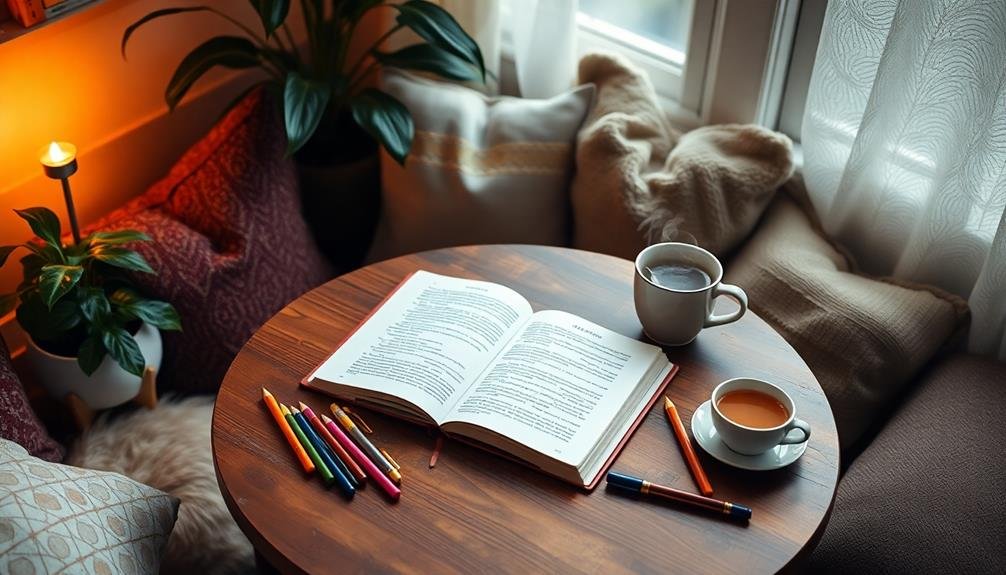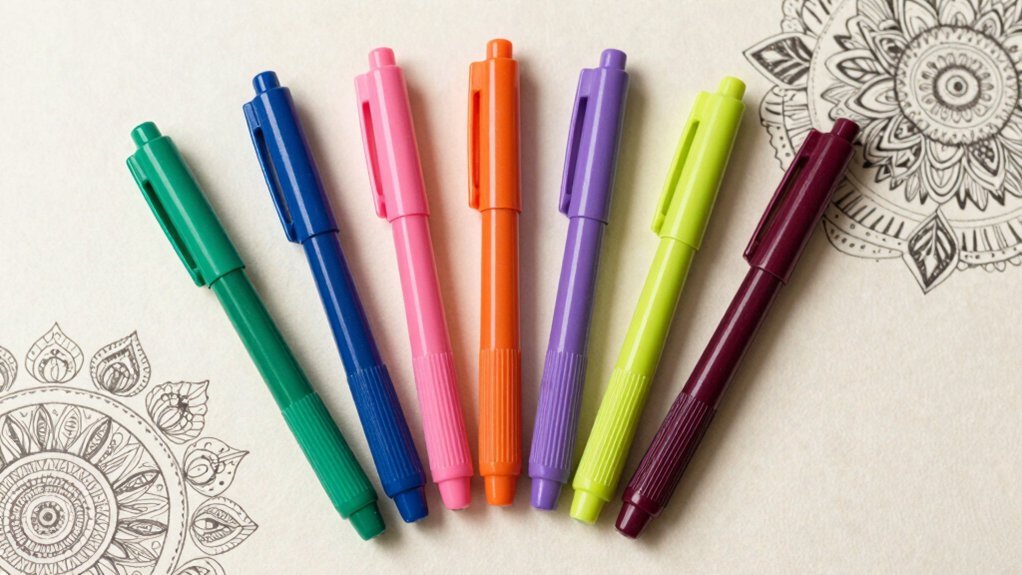If you're looking to ease social anxiety, writing can really help. Start with free writing to express your thoughts without judgment. Gratitude journaling shifts your focus to positive aspects of life. Stream of consciousness writing lets your ideas flow freely. Consider letter writing to articulate your feelings in a structured way. Dialogue journals encourage honest conversations, even with fictional characters. Use prompt-based writing to confront your anxieties in a safe space, and reflective journaling to track your emotional progress. Each technique offers unique benefits, so stick around to discover how they can transform your experience.
Free Writing

Free writing can be a powerful tool for easing social anxiety. When you sit down with a pen and paper or open your computer, you create a safe space for your thoughts. You don't have to worry about grammar or structure; just let your ideas flow. This process lets you express feelings that might be hard to articulate in social situations.
Start by setting a timer for 10 to 15 minutes. Write whatever comes to mind without stopping. Don't censor yourself or judge what you're writing. You'll be amazed at how your mind uncovers hidden worries or fears.
Free writing encourages you to confront your thoughts head-on, allowing you to process emotions that often linger beneath the surface. This practice can help you gain a better understanding of your anxieties, making them feel less overwhelming.
Once you finish, take a moment to read what you've written. You might discover patterns in your thoughts, which can guide you in handling anxiety-triggering situations more effectively.
Gratitude Journaling
After exploring free writing, another effective technique for managing social anxiety is gratitude journaling. This practice helps shift your focus from worries and fears to positive aspects of your life. By regularly acknowledging what you're thankful for, you can cultivate a more optimistic mindset, which can reduce anxiety over time.
Here's how to start your gratitude journaling journey:
- Choose a Format: Decide whether you prefer a physical journal or a digital app. Both options have their benefits, so pick what feels right for you.
- Set a Routine: Dedicate a specific time each day to write. Consistency helps make gratitude journaling a habit.
- Be Specific: Instead of general statements, focus on particular moments or people. For instance, instead of saying "I'm grateful for my friends," write "I'm grateful for Sarah's support during my tough week."
- Reflect: Take a moment to read your entries periodically. This reflection can remind you of the positivity in your life, especially during challenging moments.
Stream of Consciousness

Stream of consciousness is a powerful writing technique that allows your thoughts to flow freely without the constraints of structure or grammar. This method can be particularly helpful in easing social anxiety, as it encourages you to express your feelings without judgment. You might find that writing this way helps you articulate your worries or insecurities more clearly, giving you insight into your emotions.
Here's a simple table to illustrate the benefits of using stream of consciousness:
| Benefits | Description |
|---|---|
| Frees your mind | Lets thoughts pour out naturally |
| Reduces self-criticism | Minimizes judgment during writing |
| Enhances self-awareness | Helps you recognize patterns in your thoughts |
| Encourages creativity | Sparks new ideas and connections |
| Lowers inhibition | Makes expressing feelings easier |
Letter Writing
Letter writing can be a therapeutic way to navigate your social anxiety, allowing you to express thoughts and feelings in a structured format. Writing letters gives you the freedom to articulate emotions without the pressure of an immediate response.
Here are some tips to make your letter writing experience effective:
- Choose Your Recipient: You might write to a friend, family member, or even yourself. The choice can influence how open you feel.
- Set a Comfortable Environment: Find a quiet, familiar space where you can focus. This helps you relax and engage with your thoughts.
- Be Honest and Open: Don't hold back—write about your feelings, fears, and experiences. This honesty can help you process your emotions.
- Reflect and Review: After writing, take a moment to read what you've penned down. This can provide insights into your feelings and help you understand your anxiety better.
Dialogue Journals

Dialogue journals can be a powerful tool for managing social anxiety, as they foster a written conversation between you and a trusted individual or even a fictional character. This practice allows you to express your thoughts and feelings in a safe environment, free from judgment. By writing down your concerns, you can better understand your emotions and gain clarity on your experiences.
When you engage in dialogue journaling, think of it as a dialogue rather than just a monologue. You can pose questions, share anxieties, and even respond to your own reflections. This approach encourages deeper self-exploration, helping you to articulate your feelings and identify triggers that contribute to your anxiety.
You don't need to worry about grammar or structure; focus on authenticity. Over time, you might notice patterns in your writing that reveal insights about your social interactions.
Additionally, if you choose to write to a fictional character, it can provide a unique perspective, allowing you to explore various outcomes or responses without the pressure of real-life interactions.
Ultimately, dialogue journals can help you build confidence and develop coping strategies for social situations.
Prompt-Based Writing
Prompt-based writing can serve as an effective method for tackling social anxiety. By using specific prompts, you can channel your thoughts and feelings into written form, allowing you to express yourself without the immediate pressures of social interaction.
This technique encourages you to confront your anxieties in a controlled environment, helping you gain insight into your experiences.
Here are some prompts to get you started:
- Describe a recent social situation that made you anxious. What thoughts ran through your mind?
- Write a letter to your future self about how you've overcome your social anxiety.
- List three things you love about yourself and why they matter.
- Imagine a perfect social gathering. What would it look like, and how would you feel?
Reflective Journaling

Reflective journaling can be a powerful tool to help you manage social anxiety by allowing you to process your thoughts and feelings.
It encourages self-reflection and helps identify patterns in your emotions, which can lead to greater self-awareness.
Let's explore the benefits of reflective journaling and some tips to make your practice more effective.
Benefits of Reflective Journaling
Many individuals find that reflective journaling serves as a powerful tool for managing social anxiety. By taking time to write about your thoughts and feelings, you can gain clarity and insight into your experiences.
Here are some key benefits of reflective journaling:
- Emotional Release: Writing allows you to express your fears and anxieties, which can lighten your emotional load and promote healing.
- Self-Reflection: It encourages you to reflect on your social interactions, helping you identify triggers and patterns that contribute to your anxiety.
- Problem-Solving: Journaling can assist you in brainstorming solutions to social situations that cause discomfort, empowering you to approach them more confidently in the future.
- Increased Self-Awareness: By regularly recording your thoughts, you develop a deeper understanding of yourself, fostering self-acceptance and boosting your confidence.
Incorporating reflective journaling into your routine can greatly enhance your ability to cope with social anxiety.
It's a safe space where you can explore your feelings without judgment, ultimately leading to personal growth and improved social interactions.
Tips for Effective Journaling
Effective journaling can transform your experience with social anxiety, and there are several tips to help you get the most out of this practice.
First, set aside a specific time each day for your journaling. Consistency will create a habit and give you a structured space to explore your thoughts.
Next, don't worry about grammar or spelling. Focus on expressing your feelings authentically. Write freely about your experiences, fears, and successes, no matter how small. This isn't about perfection; it's about honesty.
Use prompts if you're unsure where to start. Questions like "What made me anxious today?" or "How did I cope with my feelings?" can guide your writing and prompt deeper reflection.
Consider incorporating gratitude into your journaling. Listing positive experiences or things you appreciate can shift your focus from anxiety and foster a more balanced perspective.
Frequently Asked Questions
How Can Writing Help Improve Communication Skills in Social Situations?
Writing sharpens your thoughts, helping you articulate ideas clearly. By practicing written communication, you gain confidence, refine your vocabulary, and translate those skills into verbal interactions, making social situations feel less intimidating and more manageable.
Are There Specific Writing Prompts for Overcoming Social Anxiety?
Yes, specific writing prompts can help. Try reflecting on a recent social situation, expressing your feelings about it. Alternatively, write a letter to your future self, envisioning a confident, anxiety-free version of you.
Can Writing Be Combined With Other Anxiety-Reducing Techniques?
Absolutely, you can combine writing with techniques like mindfulness, deep breathing, or visualization. By integrating these methods, you'll enhance your writing experience and create a more calming, focused environment that supports your anxiety reduction efforts.
How Often Should I Practice These Writing Techniques?
You should practice these writing techniques regularly, ideally daily. Consistency helps reinforce your skills and build confidence. Even short sessions can make a difference, so find a routine that fits comfortably into your schedule.
What Materials Are Best for Effective Journaling?
For effective journaling, you'll want a quality notebook and a reliable pen. Consider adding colored markers or stickers for creativity. Choose materials that inspire you and make the process enjoyable, so you'll stay motivated.
In Summary
Incorporating these writing techniques into your routine can really help ease social anxiety. By free writing or keeping a gratitude journal, you're giving yourself a safe space to express thoughts and feelings. Stream of consciousness and letter writing can clarify your emotions, while dialogue journals help you practice conversations. Using prompts and reflective journaling allows for deeper self-exploration. Embrace these methods, and you might just find yourself feeling more confident and connected in social situations.





Leave a Reply